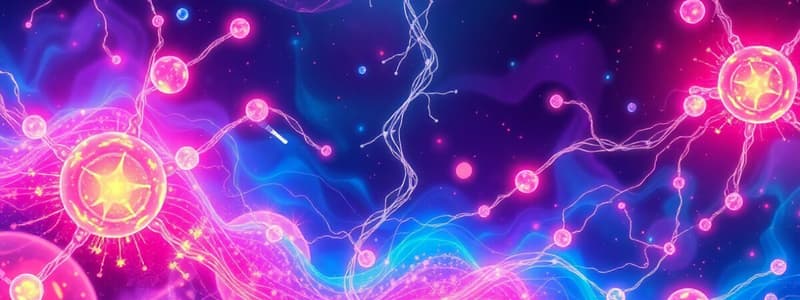Podcast
Questions and Answers
Strong electrolytes have what level of ionization in water?
Strong electrolytes have what level of ionization in water?
- No ionization
- Partial ionization
- Minimal ionization
- Complete ionization (correct)
What kind of chemical bonds are typically found in strong electrolytes?
What kind of chemical bonds are typically found in strong electrolytes?
- Hydrogen bonds only
- Metallic bonds only
- Nonpolar covalent bonds only
- Ionic or polar covalent bonds (correct)
If a solution does not conduct electricity, it is classified as what?
If a solution does not conduct electricity, it is classified as what?
- Non-electrolyte (correct)
- Strong electrolyte
- Super electrolyte
- Weak electrolyte
What is the degree of ionization ($\alpha$) for a strong electrolyte?
What is the degree of ionization ($\alpha$) for a strong electrolyte?
What is observed when testing for gas bubbles in a strong electrolyte solution?
What is observed when testing for gas bubbles in a strong electrolyte solution?
What best describes the lightbulb's brightness when testing a weak electrolyte?
What best describes the lightbulb's brightness when testing a weak electrolyte?
What kind of chemical bonds are present in non electrolytes?
What kind of chemical bonds are present in non electrolytes?
What is the lightbulb's brightness when testing a non-electrolyte?
What is the lightbulb's brightness when testing a non-electrolyte?
Weak electrolytes have what level of ionization in water?
Weak electrolytes have what level of ionization in water?
Flashcards
Strong Electrolyte
Strong Electrolyte
A solution that conducts electricity strongly due to a high concentration of ions.
Weak Electrolyte
Weak Electrolyte
A solution that conducts electricity weakly because it only partially ionizes in solution.
Non-Electrolyte
Non-Electrolyte
A substance that does not ionize in solution and thus does not conduct electricity.
Ionization
Ionization
The process by which a neutral atom or molecule acquires a positive or negative charge.
Signup and view all the flashcards
Degree of Ionization (α) for Strong Electrolytes
Degree of Ionization (α) for Strong Electrolytes
Ionization level of strong electrolytes, where α = 1, indicating complete dissociation into ions.
Signup and view all the flashcards
Degree of Ionization (α) for Weak Electrolytes
Degree of Ionization (α) for Weak Electrolytes
Ionization level of weak electrolytes, where 0 < α < 1, indicating partial dissociation into ions.
Signup and view all the flashcards
Degree of Ionization (α) for Non-Electrolytes
Degree of Ionization (α) for Non-Electrolytes
Ionization level of non-electrolytes, where α = 0, meaning no ionization occurs.
Signup and view all the flashcards
Chemical Bonds
Chemical Bonds
The force that holds atoms together in molecules or crystals.
Signup and view all the flashcards
Polar Covalent Bond
Polar Covalent Bond
A type of chemical bond where electrons are shared between atoms, leading to partial charges.
Signup and view all the flashcards
Non-Polar Covalent Bond
Non-Polar Covalent Bond
A type of chemical bond where electrons are equally shared between atoms.
Signup and view all the flashcardsStudy Notes
Electrolyte and Non-Electrolyte Solutions
- This covers strong electrolytes, weak electrolytes, and non-electrolytes.
Strong Electrolytes
Gas Bubble Test
- Abundant gas bubbles are produced.
Electrical Conductivity
- High electrical conductivity is observed.
Lamp Test
- A bright light is observed.
Ionization in Water
- Complete ionization occurs.
Chemical Bonding
- Ionic or polar covalent bonds are present.
Degree of Ionization (α)
- α = 1
Weak Electrolytes
Gas Bubble Test
- Few gas bubbles are produced.
Electrical Conductivity
- Low electrical conductivity is observed.
Lamp Test
- The light is dim or off.
Ionization in Water
- Partial ionization occurs.
Chemical Bonding
- Ionic or polar covalent bonds are present.
Degree of Ionization (α)
- 0 < α < 1
Non-Electrolytes
Gas Bubble Test
- No gas bubbles are produced.
Electrical Conductivity
- No electrical conductivity is observed.
Lamp Test
- The light is off.
Ionization in Water
- No ionization occurs.
Chemical Bonding
- Polar covalent or non-polar covalent bonds are present.
Degree of Ionization (α)
- α = 0
Studying That Suits You
Use AI to generate personalized quizzes and flashcards to suit your learning preferences.




